|
|
Elements of self-consciousness I and II
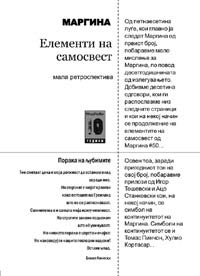 We continue with the mini-retrospective of texts
published throughout Margina in this column but also in other
sections of the magazine. The texts are kind of ideological and
theoretical stances, which corresponds with the basic ideas of the
magazine. We also asked about fifteen people to give their small
note about what they think Margina is, on the tenth anniversary of
Margina. We received about ten answers, which we present below. We continue with the mini-retrospective of texts
published throughout Margina in this column but also in other
sections of the magazine. The texts are kind of ideological and
theoretical stances, which corresponds with the basic ideas of the
magazine. We also asked about fifteen people to give their small
note about what they think Margina is, on the tenth anniversary of
Margina. We received about ten answers, which we present below.
"First of all, we think that the difference, the asymmetry and
the conflict are constitutional feathers of our world. As Chantal
Mouffe puts it the ideal of substantive common interest, of
consensus and unity, is illusion. We must admit that the antagonism
plays key role in the social life and we must announce "the sane
democratic process asks for vibrating clash of political positions
and open conflict of interests". So our aim is to widen the
political frame that has to accept the difference and the antagonism
for sustaining what Mouffe calls "agonistic pluralism". (Margina,
62)
"MARGINA is window over which we bent and look in the horizon.
Margina exist in our culture more silent than the silence of the
graveyard. It is the only magazine from the culture and philosophy
worth mentioning in our recent history. It does not make compromises
in its choice and views; it takes care about them and develops them.
It develops a nice, cultural, cool relation and promotion of the
visuality and the design by our authors". (Ljubomir D. Frckoski)
Igor Toshevski - key words of Margina
(transfers and typography)
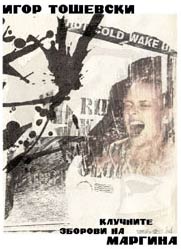 The renown Macedonian artist Igor Tosevski, as a kind of
continuation of his recent exhibition "Transfers" held in cultural
center Tocka, refers to the words which are most connected
with the magazine: surfing on ages, self-consciousness, difference,
decentralization, center, margina, integration. His Transfers
are complex metaphors which similarity is not based on the only one
point or on analogies but on a delicate research of the visual
medium. As a matter of fact, it seems that his Transfers -
which could be understood as a print metaphor - create a certain
resonance, tendency of widening of the meanings and attracting of
other fields of meanings. The renown Macedonian artist Igor Tosevski, as a kind of
continuation of his recent exhibition "Transfers" held in cultural
center Tocka, refers to the words which are most connected
with the magazine: surfing on ages, self-consciousness, difference,
decentralization, center, margina, integration. His Transfers
are complex metaphors which similarity is not based on the only one
point or on analogies but on a delicate research of the visual
medium. As a matter of fact, it seems that his Transfers -
which could be understood as a print metaphor - create a certain
resonance, tendency of widening of the meanings and attracting of
other fields of meanings.
Thomas Pynchon
 As an important symbolic junction between the first and the present
Margina, besides the "ideologist" Derrida we choose Thomas
Pynchon, author that actually opened the first issue. The short
story "Death and mercy in Vienna" is the second one that is
published in our magazine. "The small rain" was the first one. In
1994 our publishing house Templum published a selection of
his only book of short stories by Pynchon. With the book and the two
stories we practically translated into Macedonian all his published
stories. As an important symbolic junction between the first and the present
Margina, besides the "ideologist" Derrida we choose Thomas
Pynchon, author that actually opened the first issue. The short
story "Death and mercy in Vienna" is the second one that is
published in our magazine. "The small rain" was the first one. In
1994 our publishing house Templum published a selection of
his only book of short stories by Pynchon. With the book and the two
stories we practically translated into Macedonian all his published
stories.
Thomas Pynchon (1937) is one of the most important and most
influental American writers in the second half of 20th century.
Although his novels are regarded as hard for reading, he would be
remarked as one of the authors who gave significant impulse for many
new literary experiments - from the postmodernism, hyperliterature,
to cyberpunk.
Immanuel Wallerstein - New left for the 21th
century?
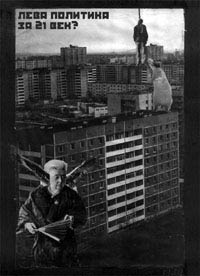 Immanuel Wallerstein (1930) is one of the biggest American
sociologists, the founder of the world-systematic analysis. He is
one of the most provocative historians of capitalism. The texts we
published in this number of Margina are continuation of his
earlier works. In time when the world political scene is dominated
by only one ideological option, he tries to think over, to give
vision, but also to shade the skirts of what would follow after the
disappearance of the capitalism from the world scene. His insight
comes in the real moment and are most significant critical and
alternative interpretations of our time. Immanuel Wallerstein (1930) is one of the biggest American
sociologists, the founder of the world-systematic analysis. He is
one of the most provocative historians of capitalism. The texts we
published in this number of Margina are continuation of his
earlier works. In time when the world political scene is dominated
by only one ideological option, he tries to think over, to give
vision, but also to shade the skirts of what would follow after the
disappearance of the capitalism from the world scene. His insight
comes in the real moment and are most significant critical and
alternative interpretations of our time.
"After 500 years, the world capitalistic system is for the first
time in a real systematic crisis. In the next 50 years a new
historical system will emerge. Worldwide, the battle how it will
look like has started".
Aleksandar Stankovski - Unidentified
(comics)
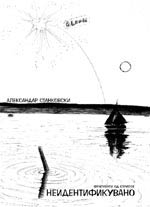 The persistent "collaborator" of
Margina, the comics artist, Aleksandar Stankovski gave his
newest comics "Unidentified" which is continuation of his
underground poetics, envisioned in the comics "Minorities of
realities" which came out in parts in the last several years in
Margina. The persistent "collaborator" of
Margina, the comics artist, Aleksandar Stankovski gave his
newest comics "Unidentified" which is continuation of his
underground poetics, envisioned in the comics "Minorities of
realities" which came out in parts in the last several years in
Margina.
Drugs and technology
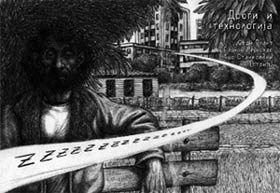 For third time we came back on the issue
about drugs, this time trying to reflect them from the view of the
technology. This relation becomes very important in the recent 20
years with the outburst of the synthetic drugs, but also with the
developement of the cyberpunk, cyberfeminism and other branches of
cyber literature. We present three texts by original authors and the
portrait Simon Renolds makes for Sadie Plant which appears the most
persistent theoretition on the issue. For third time we came back on the issue
about drugs, this time trying to reflect them from the view of the
technology. This relation becomes very important in the recent 20
years with the outburst of the synthetic drugs, but also with the
developement of the cyberpunk, cyberfeminism and other branches of
cyber literature. We present three texts by original authors and the
portrait Simon Renolds makes for Sadie Plant which appears the most
persistent theoretition on the issue.
Sadie Plant was born in Birmingham, UK in 1964, and read Philosophy
at Manchester University. She graduated with a First Class
Honours degree in 1985, and completed her PhD in 1989. After
working as Post-doctoral Research Assistant at Queen Mary and
Westfield College, she was appointed Lecturer in Cultural Studies at
the University of Birmingham in 1990. Her first book, The Most
Radical Gesture, The Situationist International in a Postmodern Age,
was published by Routledge in 1992. In 1995, she was
appointed Research Fellow at the University of Warwick, where she
established the Cybernetic Culture Research Unit.
In 1997, she left the University of Warwick to write full-time.
Zeros and Ones, Digital Women and the New Technoculture, was
published by Fourth Estate in London, and Doubleday in
New York, and her most recent book, Writing on Drugs, was
published in 1999 by Faber and Faber in London, and in 2000
by Farrar Straus and Giroux in New York. She has published
articles in publications as varied as the Financial Times, Wired,
Blueprint, and Dazed and Confused. Her work has been
discussed in much of the UK press and several overseas newspapers
and journals. Most recently she was named as one of the "People to
Watch" in the Winter 2000/2001 issue of Time.
CULTURE JAMMING
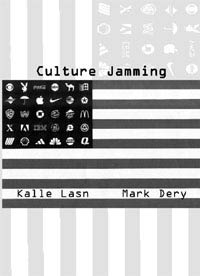 As a publisher and founder of Adbusters
Media Foundation Kalle Lasn belongs to the front line of media
scepticists. As a person who fights strongly for his views, he has
formed Culture Jammers, media activists organization that
regards itself 'as one of the most significant social movements in
the last twenty years". "Our aim is to confront with the existing
power structures and to stimulate the process of deep rethinking
about the way we live in the 21st century... It will change the way
we live and think. The way of information flow would change, the way
the institutions use it's power, the way TV stations are managed,
the way the food, fashion, car, music and culture industry plan and
work. And first of all the way of our interaction with the media, as
well as the way that our society derives the meaning", Lasn said. As a publisher and founder of Adbusters
Media Foundation Kalle Lasn belongs to the front line of media
scepticists. As a person who fights strongly for his views, he has
formed Culture Jammers, media activists organization that
regards itself 'as one of the most significant social movements in
the last twenty years". "Our aim is to confront with the existing
power structures and to stimulate the process of deep rethinking
about the way we live in the 21st century... It will change the way
we live and think. The way of information flow would change, the way
the institutions use it's power, the way TV stations are managed,
the way the food, fashion, car, music and culture industry plan and
work. And first of all the way of our interaction with the media, as
well as the way that our society derives the meaning", Lasn said.
What is this project about? It is about the rethinking of the
obssesive, consumeristic culture we live in. It partilly happend in
the ideologica field, and partially of nonviolent resistance -
culture jamming actions, and their interventions in jumbo-posters,
the hackers' intrusion onto corporations' web pages in order to
reveal the thruth about their actual practice.
Julio Cortazar 20 years from death
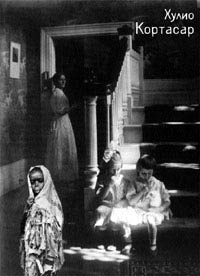 Julio Cortazar is an important symbol of
Margina and the publishing house Templum. On the 20th
year from his death and 90 years from his birth we published three
short stories, non translated into Macedonian so far: Hunted
house, Axolotle, and Nobody's fault. We also publish Jose
Manuel Fajardo's text Che Guevara of literature on the 20
years from his death which appeared in the February 2004 issue of
La monde diplomatique. Julio Cortazar is an important symbol of
Margina and the publishing house Templum. On the 20th
year from his death and 90 years from his birth we published three
short stories, non translated into Macedonian so far: Hunted
house, Axolotle, and Nobody's fault. We also publish Jose
Manuel Fajardo's text Che Guevara of literature on the 20
years from his death which appeared in the February 2004 issue of
La monde diplomatique.
Julio Cortazar is one of the wellknown Argentinian writes, who
together with Jorge Luis Borges and Ernesto Sabato makes the holy
trinity of the Argentinian literature. Born in 1914 in Brussels.
After emigration from Argentina, he moves to Paris where he first
where he works as translator for UNESCO. Becames famous with his
novel Hopscoch published in 1963. his stories are example of
fantastic literature. Antonioni shooted his film Blow up
based on one of his novels. Cortazar was member of Russel Judge,
he stands for leftist movement in South America, and writes essays
with political content. He dies in Paris "the city which inspired me
for a novel", in 1984, as a citizien of France.
MARGINA 1994-2004, BIBLIOGRAPHY |